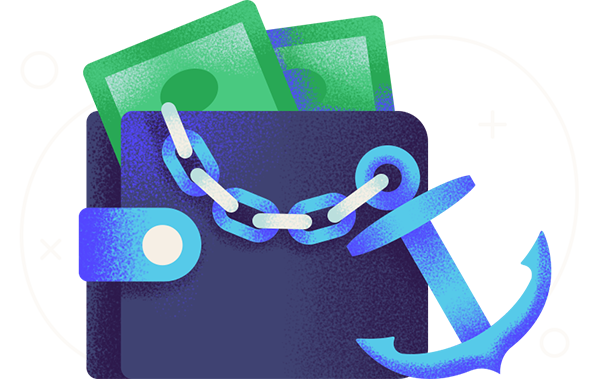Being financially stable means you have enough money to comfortably cover your living expenses and prepare for the future, thanks to a reliable income and sound money management habits. In addition to being able to pay your bills, you’ll need an emergency fund to cover unexpected expenses.
Try WalletHub's budgeting tools!
Factors That Define Financial Stability
There are multiple indicators of financial stability, and you can check out the most important ones below. If these factors are true in your situation, it’s a good sign that you are doing well financially.
Steady income. You need to have money coming in on a regular basis that you can use to pay your expenses.
Not relying on credit cards or loans to cover expenses. WalletHub’s Emergency Savings survey found that 33% of people use a credit card or loan to cover a major unexpected expense. Being financially stable means you have some savings to pay for an unexpected expense without taking out debt.
Not spending more than you earning. You need to spend within your means to be considered financially stable. This allows you to have enough money for necessary expenses and discretionary spending without going into debt. Being financially stable.
Paying bills on time. People who are financially stable don’t have past-due bills mounting up. In addition, paying your bills on time has a positive effect on your credit score and shows lenders and creditors that you are responsible with money.
Being prepared for emergencies. To be financially stable, you need to have money set aside for emergencies so unexpected expenses don’t destroy your financial plan. Unfortunately, more than 1 in 3 people don’t have $400 in cash to cover an emergency expense, according to the Federal Reserve. Furthermore, a WalletHub survey found that almost 1 in 5 people wouldn’t be able to come up with $1,000 in cash within 24 hours to save a loved one’s life.
Having a good WalletScore. Your WalletScore tells you what kind of shape your finances are in overall. It reflects your credit, spending, emergency preparedness, and ability to retire at a reasonable age. The higher your score is, the more financially stable you are.
Key Statistics on Americans’ Financial Stability
- 72% of Americans report being financially stable in 2023, according to the Federal Reserve, with 39% saying they are doing okay financially and 33% saying they are living comfortably.
- 26% of Americans are living paycheck to paycheck, spending 95% or more of their income on necessary expenses like housing, food, child care and transportation, according to Bank of America.
- 1 in 4 people never contribute to their emergency fund, according to a WalletHub survey, leaving these people without a safety net to cover unexpected expenses.
- Only 54% of Americans have 3 months’ worth of expenses in their emergency fund, according to the latest data available from the Federal Reserve.
Why Is Financial Stability Important?
Financial stability is important since it provides peace of mind, reduces stress and saves you money. Below are more benefits to being financially stable.
You can focus on enjoying life. When you don’t have to worry about finding money to pay your bills, you can focus on things you enjoy and accomplishing your financial goals, such as buying a house, going on vacation, or starting a business.
It’s good for your credit. When you have a steady income, low debt, and a good payment history, it’s a signal to creditors that you are responsible with money. This increases your ability to get a loan for a home or car, for example. In addition, it will be cheaper for you to take on debt since you are more likely to get a low interest rate compared to someone who is not financially stable.
May prevent health problems caused by money worries. Being financially unstable can lead to financial stress, which can have a negative effect on your overall health. Experts say high levels of financial stress can make you twice as likely to have poor overall health, and it can lead to migraines, high blood pressure, and sleep problems.
How to Become Financially Stable
Make a Budget and Stick to It
Making a budget helps you plan out your spending, so you can prioritize setting aside money for your essential expenses and avoid overspending on unnecessary purchases. A budget can also help you find areas you can cut back on spending so you can find money to put into savings.
Pay Down Your Debt
High-interest debt can eat away at your savings. By allocating more money to debt payments, you can reduce the amount of interest you pay and become debt-free sooner. You can also divert the funds you would have wasted on interest to savings instead.
You can make a debt payoff plan here on WalletHub to find the quickest and cheapest way out of debt.
Live Within Your Means
When you spend less money than you earn, you can put the money you have left over into savings. You will then have a financial safety net that you use to pay for unexpected expenses, such as a sudden medical bill. You can also use those funds to work toward any financial goals you may have.
Reduce Unnecessary Spending
Cutting back on your discretionary spending can help you reach financial stability by giving you some extra money that you can put into savings. Some things you can do to reduce unnecessary spending include cooking at home instead of dining out at restaurants or getting take out, lowering your energy consumption at home to reduce your utility bill, using a shopping list at the grocery store, and looking for discounts.
Treat Savings as an Expense
You should include contributions to your savings in your budget like you would any other expense. Much like how you can set up automatic payments for your bills, you can set up your checking account so that it automatically transfers money to your savings every month. That way, you do not forget to do it.
Build an Emergency Fund
An emergency fund is money you set aside to cover unexpected expenses, like an expensive car or home repair bill. Experts recommend having three to six months’ worth of your living expenses in your emergency fund. However, if that seems unattainable, you can start small and work your way up. Try saving whatever you can, even if it’s $5 to $10 per paycheck.
Save for Retirement
Part of being financially stable is making sure you have money to pay for your expenses during retirement. WalletHub’s Retirement Savings Survey found that 46% of people are not confident that they will have enough money to retire. Setting up and contributing to a retirement account can help you make sure you have enough money when you no longer work.
Follow Customized Advice on WalletHub
WalletHub gives users customized recommendations about their credit score, spending, and overall financial health with the WalletScore feature. Following WalletHub’s advice can help you reach financial stability.
Learn more money management tips that can help you become financially stable.


WalletHub experts are widely quoted. Contact our media team to schedule an interview.